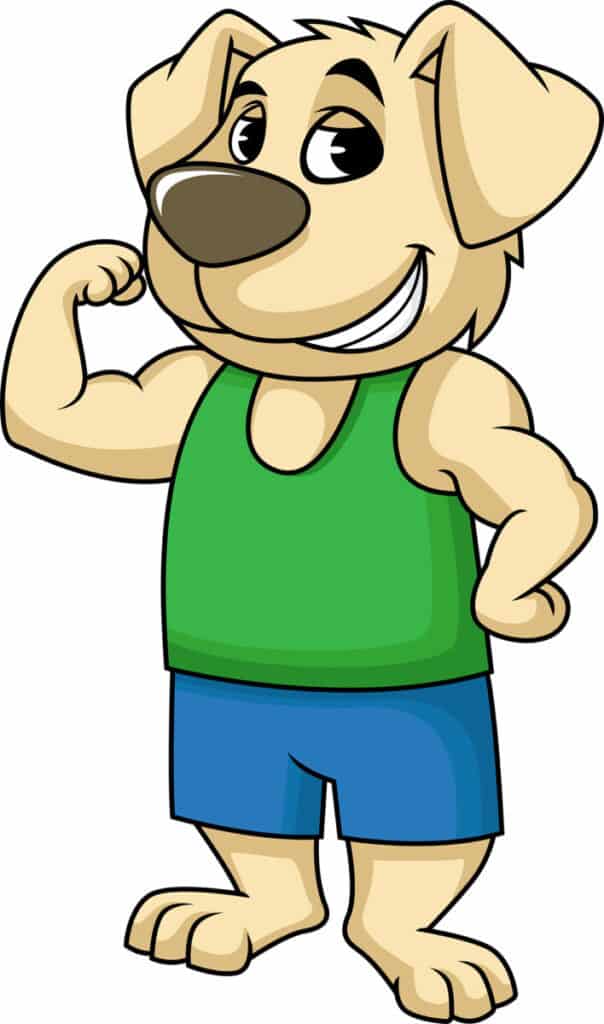
Martial arts is an activity that requires the activation of the full body and mind. Gaining muscle is the result of consistent and repetitive movements, so the practice of martial arts can result in increased muscle mass for children. The benefits of gaining both muscle and mind power as a child will translate over into all facets of their life.
A child practicing martial arts consistently will gain some muscle. Muscle is gained and built through resistance training and consistent, repetitive movements. Martial arts fall under this category. The full-body involvement of martial arts will result in muscle gain in all areas for a child.
A child’s involvement in sport builds more than muscle and great endurance; it teaches life lessons through dedication, motivation, and work ethic. This is ‘Mind Muscle’. Encouraging the practice of sport and other active arts helps to develop a strong, empowered, and resilient child. Keep reading to learn more about how martial arts will affect your child.
Contents
A Child Can Gain Muscle From Martial Arts
Martial Arts is a full-body workout. A child practicing martial arts will realize that one movement requires the activation of many different muscle groups in the body. When the muscles begin to experience repetitive, power-driven movements, muscle gain, and muscle tone is the byproduct.
Repetitive movements that cause muscle gain:
- Push-ups/Pull-ups
- Jumping fast twitch muscle training
- Throws and takedowns
- Hold downs or pins
- Arm striking techniques
- Leg striking techniques
- Core exercises
- Bodyweight exercises
- Sparring drills
- Stretches and warm-up exercises
Typically, the idea of gaining muscle often leads to the assumption that physical weight lifting has to be involved. Lifting weights isn’t the only way to build muscle and isn’t recommended for children until they hit puberty around the ages of 12-14.
Before puberty, many researchers and physicians do not recommend weight training due to injury risks in developing bodies. In the journal The Physician and Sportsmedicine a study concluded that contrary to what many coaches and instructors of young child athletes, weighted training holds more risks than benefits.
Because of this, Karate and other martial arts are an excellent body weight alternative to develop strength and muscle in younger children. Feel free to have your child try out one of our online Karate classes for free. Check out the other benefits of my class here in this article. Your child can develop muscle, strength, coordination, and balance right from your own home.
How Gaining Muscle Works

Without getting too scientific, understanding the process of muscle gain will lead to a better understanding of how martial arts can create muscle gain in a child.
It is apparent that there are physiological differences in a child versus an adult, however, the equation for gaining muscle remains the same. The body goes through the same process regardless of age or size.
When skeletal muscle repeatedly contracts through movement, the muscles become stressed. When muscles are stressed, they’re damaged and require repair. The repair phase takes place during rest, and it is here that the process of muscle repair creates the growth and strength of the muscles.
How Does A Child Gain Muscle?
There is a trifecta for muscle gain; muscle tension, muscle stress, and metabolic stress.
- Muscle Tension- the contraction of muscle during a prolonged period.
- Muscle Stress- repeated contraction resulting in fatigue and micro muscle tears.
- Metabolic Stress- the usage and breakdown of energy during exercise ( aka “feeling the burn”).
An active child participating in movements that require muscle stress, muscle tension, and metabolic stress will experience muscle gain. Depending on the timing and when puberty hits, a teenager can trigger muscle gain more easily.
For children who are not yet approaching puberty, gaining muscle is the result of the body experiencing a consistent practice of resistance. This means practicing some type of body resistance or bodyweight activity several times a week, like martial arts.
Is It Good For A Child To Gain Muscle?
Muscle gain for children is extremely beneficial.
- Enhances overall body strength
- Increases endurance for daily activities and sports
- Sets up a strong foundation of bone density
- Increases tendon and ligament strength
- Increased self-confidence
When specific movement patterns, such as those experienced in martial arts, are practiced consistently, muscle memory is increased. Naturally, the body adapts and becomes more efficient at moving.
Muscle gain is a major component involved in the efficiency of many bodily functions. Therefore continuation of these movements will lead to additional muscle being built by the body.
But, Is Child Muscle Gain Bad?
There are important caveats to keep in mind. There is a difference between gaining muscle and bulking up. Educating children on the benefits and risks of trying to bulk up too early on is a great way to have a bonding conversation.
Engaging in martial arts with a natural outcome of muscle gain and strength is encouraged. Trying to build big muscles at a young age is not. Children who begin lifting weights will put too much strain on the tendons and potentially stunt the natural process of cartilage and bone growth.
What Kind Of Strength Gains Can You Expect From Martial Arts?
Although the practice of martial arts is very centered around skill acquisition and requires a significant amount of time devotion to improve, it is always going to be an expression of strength. Like with all skills and sports, the more time devoted, the better and stronger one will become.
A child in martial arts can expect a steady build of muscle adaptation over time. Martial art practices, like jiu jitsu or judo, require a foundation of strength. For example, both arm and leg grip strength when going against an opponent.
With continued practice and reps, a child will begin to notice they are able to lock down their opponent or throw a harder bunch without fatiguing as quickly; this is strength gain.
Which Martial Art Practice Is Best For Muscle Gain?
There are many types of martial art practices that a child can participate in and reap the benefits of full-body muscle gain. Although each have their unique approaches and philosophies all require similar muscle use and highly repetitive movements, all resulting in strength and muscle gain.
Judo–
A Japanese martial art that uses practices of self-defense and discipline. It requires the full-body to execute the movements and promotes the use of all the major muscle groups. It centers on throwing an opponent or taking them to the ground and pinning them in position. For children this is a complete body workout without punching or kicking. For adults, submission pain and choking holds are added.
Jujitsu–
A Japanese martial arts system of unarmed combat and physical training though based primarily on Samurai armed movements. Though the act of resisting another human’s force is a powerful way to build muscle strength throughout the entire body, Jujitsu also teaches how to use another’s force against them. Working both major muscle groups and smaller stability muscles is a benefit of Jujitsu. Judo was developed from this larger style.
Karate–
Karate is a Japanese martial art similar to Korean TaeKwonDo and Chinese Kung Fu. It involves punches, kicks, throws, and attacks. It is a type of martial arts that is heavy in body development, conditioning, and has sparring, which means one on one contact drill scenarios. Similarly, the repetition, resistance based movements will build muscle throughout the entire body overtime.
Gain More Than Just Muscle Mass
Martial arts is known to be a powerful tool in developing both the mind and body. Not to mention, self-defense. Many of the arts focus on discipline and enrichment of the mind.
The philosophies that are taught alongside the physical movements are lessons that will remain with a child throughout a lifetime. Not only is it a great way to learn more about themselves, but it promotes self-discipline, teaches goal-setting, and provides healthy competition.
Gain Mind Power
The power of the mind has always been an important aspect of martial arts. Martial arts can become an outlet for a child’s self-development without them even realizing it. For parents, this is great.
The repetitive movements and patterns in martial arts require intention and awareness teaching the mind of a child to focus on the task at hand. If outside distractions are allowed, the fight against an opponent during competition is lost.
Gain The Strength Of Responsibility
Martial arts teaches a child to take responsibility for their own improvement and successes. By forcing the child to understand that practice and dedication leads to improvement and advancement, they are learning an important lesson that will apply to many different situations throughout their lives.
More Health Benefits From Martial Arts
- Mental health- Exercise is one of the most important contributors to maintaining mental health, especially for children. If you’d like to investigate further, then you might like to read my other article, found here, about how martial arts can support your child’s emotional health.
- Mind/Body Connection- Recognizing how much power and influence the mind has on thoughts and actions of the body.
- Stability and Coordination- Executing the moves in martial arts builds a plethora of skills that will translate over into all sports and activities.
- Cardiovascular Health- Aerobic exercise in the foundation for building a strong, enduring heart.
Child Muscle Gain Take Away
A child can gain muscle and a lifetime of skills from practicing martial arts. Muscle gain from martial arts is beneficial to a child’s health when it is approached in the appropriate way with the involvement and supervision of the parents. Additionally, a child can improve their mental strength and learn lessons valuable later in life.
Sources:
https://www.sunrisingbedding.com/5-factors-affect-muscle-growth-children;
